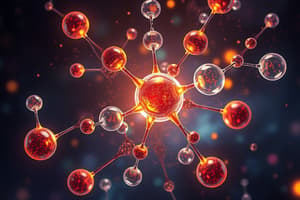Podcast
Questions and Answers
What is the chief advantage of a mechanistic approach in organic chemistry?
What is the chief advantage of a mechanistic approach in organic chemistry?
- It allows for the explanation and interrelation of existing facts.
- It can forecast the outcome of changing conditions in known reactions.
- It can predict the products of new reactions.
- All of the above. (correct)
What is the purpose of the chapter mentioned in the text?
What is the purpose of the chapter mentioned in the text?
- To outline guiding principles in organic chemistry.
- To explain the compounds of carbon.
- To show how guiding principles work.
- All of the above. (correct)
What is the focus of the compounds discussed in the text?
What is the focus of the compounds discussed in the text?
- Compounds of carbon with hydrogen.
- Compounds of carbon with other elements. (correct)
- Compounds of carbon with nitrogen.
- Compounds of carbon with oxygen.
What can a mechanistic approach in organic chemistry do?
What can a mechanistic approach in organic chemistry do?
What is the advantage of a mechanistic approach in organic chemistry?
What is the advantage of a mechanistic approach in organic chemistry?
Study Notes
Advantages of a Mechanistic Approach in Organic Chemistry
- Mechanistic approach offers a way to explain and interrelate existing facts in organic chemistry.
- It provides a means to forecast the outcome of changing conditions in known reactions.
- It can also predict the products that may be expected from new reactions.
- The guiding principles of a mechanistic approach are relatively few in number.
- These principles can be used to explain and interrelate existing facts in organic chemistry.
- The approach can be used to forecast the outcome of changing conditions in known reactions.
- It can also predict the products of new reactions.
- The focus of this chapter is to outline some of these guiding principles and demonstrate how they work.
- The compounds of carbon are the main focus in this chapter.
- Carbon atoms can form bonds with other atoms, particularly other carbon atoms.
- The chapter will discuss the way carbon atoms form bonds with other atoms.
- The mechanistic approach in organic chemistry allows for a systematic understanding of reactions and their outcomes.
Studying That Suits You
Use AI to generate personalized quizzes and flashcards to suit your learning preferences.
Description
Test your knowledge of organic chemistry and its mechanistic approach with this quiz. Explore how a few guiding principles can be used to explain, interrelate, and predict reactions and their products.




